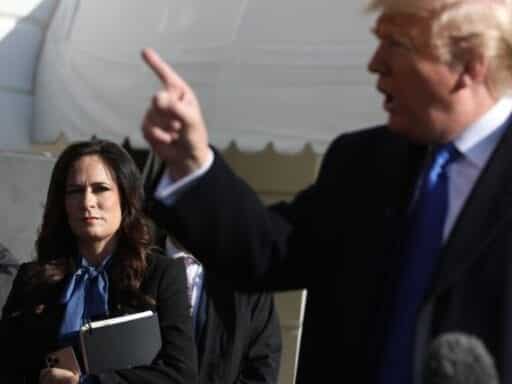Trump attacked a widow by denigrating her dead husband. The White House is portraying Trump as the real victim.
On Thursday, White House surrogates for President Donald Trump proved that they’re willing to defend anything by going on TV and trying to justify remarkably crass comments President Donald Trump made suggesting that the late Rep. John Dingell (D-MI) is in hell.
Trump’s remarks on Wednesday evening during his rally in Battle Creek, Michigan, were meant as a shot at Dingell’s widow — Rep. Debbie Dingell, who now serves in John’s old House seat — because she voted in favor of two articles of impeachment that same day.
Referring to a phone call Trump had with Debbie after John passed away last February, Trump said, “She calls me up. It’s the nicest thing that’s ever happened. ‘Thank you so much. John would be so thrilled. He’s looking down. He’d be so thrilled. Thank you so much, sir.’” (Debbie Dingell claims Trump’s account is false and that he in fact called her.)
But Trump then suggested that heaven might not be where John Dingell, a World War II veteran who became the longest-serving Congress member in the country’s history, ended up.
“I said, ‘That’s OK, don’t worry about it.’ Maybe he’s looking up, I don’t know,” he said, prompting audible groans from the audience. “But let’s assume he’s looking down.”
Trump laments that Debbie Dingell voted to impeach him despite the fact that he allowed the normal state funeral to proceed for her late husband, former Rep. John Dingell. Trump then suggests John Dingell is in hell — to audible groans. pic.twitter.com/wsYfddNIA9
— Aaron Rupar (@atrupar) December 19, 2019
Debbie Dingell responded to Trump with a tweet addressed directly to him in which she noted that she’s “preparing for the first holiday season without the man I love” and said his remarks “brought me down in a way you can never imagine and your hurtful words just made my healing much harder.”
Trump’s comments prompted bipartisan condemnation and calls for him to apologize. But on Thursday, White House press secretary Stephanie Grisham and deputy press secretary Hogan Gidley went on TV and made clear that the president intends to do no such thing.
On ABC’s Good Morning America, host George Stephanopoulos asked Grisham, “Why do you think the president said that last night?” She responded by describing Trump as a “counter-puncher.”
“As we all know, the president is a counter-puncher. It was a very, very supportive and wild crowd,” she said. “He was just riffing on some of the things that had been happening the past few days.”
STEPHANOPOULOS: Why did Trump joke about John Dingell being in hell at his rally last night?
STEPHANIE GRISHAM: “As we all know, the president is a counter-puncher. It was a very supportive and wild crowd. He was just riffing.” pic.twitter.com/Wv8BuP8t3u
— Aaron Rupar (@atrupar) December 19, 2019
When Gidley was asked a similar question during a subsequent Fox News appearance, he went even further in trying to portray Trump — not the Dingells — as the victim.
“No matter what the president says people are going to parse it apart, try and tear it apart, and focus on the most negative aspects of it,” Gidley said, as if there were any positive aspects to Trump’s comments.
“He’s been under assault ever since he took the oath of office. Even before — for the last several years,” Gidley continued. “And so, look, it’s understandable that someone’s frustrated by the fact that you have 93 percent negative news coverage against you, even though you have so many successes on behalf of the American people.”
WH spox Hogan Gidley responds to Trump joking about John Dingell being in hell by trying to make *Trump* the victim: “No matter what the president says…people are going to parse it apart, try & tear it apart & focus on the most negative aspects of it…he’s been under assault” pic.twitter.com/gV3uEllRkS
— Aaron Rupar (@atrupar) December 19, 2019
While the White House tried its best to pass off Trump’s comments as no big deal, House Speaker Nancy Pelosi characterized Trump’s comments as “very sad” during a news conference.
Referring to a similar attack Trump made against the late Sen. John McCain earlier this year, Pelosi said the president “is clearly insecure when it comes to statespersons.”
“Let us pray for the president,” she added. “What the president misunderstands is that cruelty is not wit … it’s not funny at all. It’s very sad.”
Pelosi on Trump suggesting John Dingell is in hell: “Let us pray for the president … think of what he said about John McCain & his supporters just overlooked that. Now John Dingell. What POTUS misunderstands is that cruelty is not wit … it’s not funny at all. It’s very sad” pic.twitter.com/WqtQwEcK6p
— Aaron Rupar (@atrupar) December 19, 2019
Just after Pelosi wrapped up, House Minority Leader Kevin McCarthy held a news conference in which he dodged questions about Trump’s comments but described John Dingell as a “very bright individual” who “made a great contribution to America.”
Trump, for his part, ignored repeated questions about whether he’ll apologize to Dingell during a media availability at the White House on Thursday afternoon. But if past Trump scandals have taught us anything, it’s that he is far more likely to escalate his attacks than he is to express any sort of remorse.
The news moves fast. To stay updated, follow Aaron Rupar on Twitter, and read more of Vox’s policy and politics coverage.
Author: Aaron Rupar
Read More



